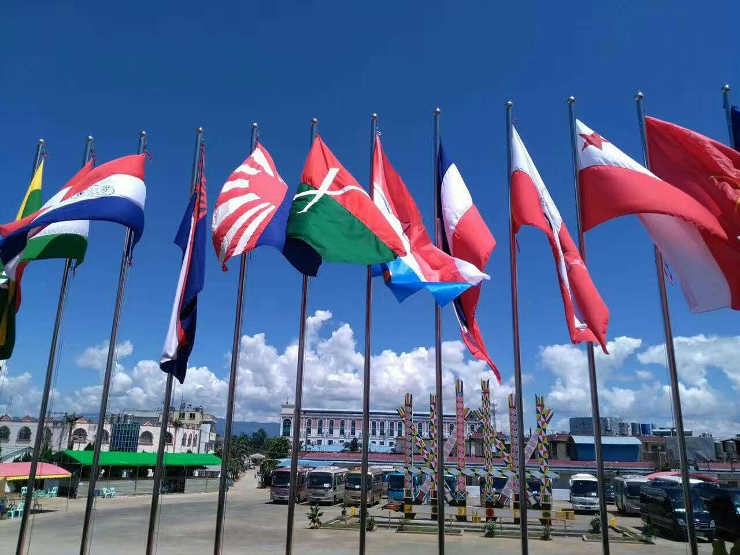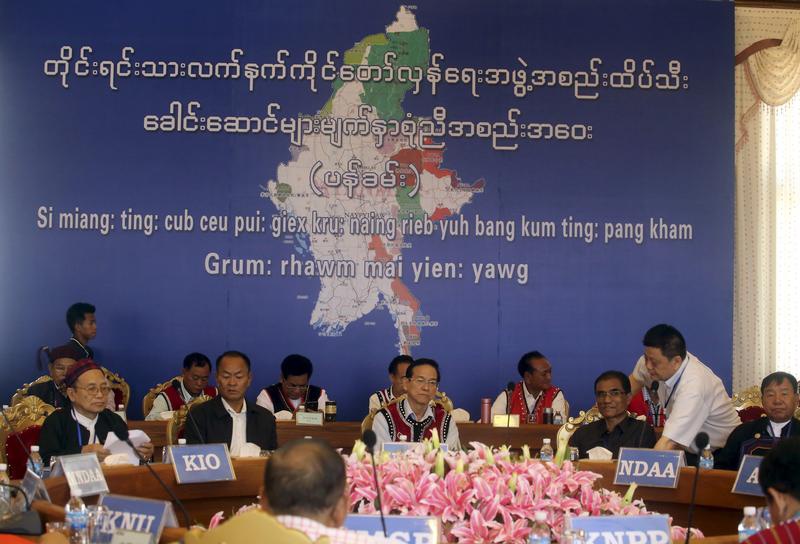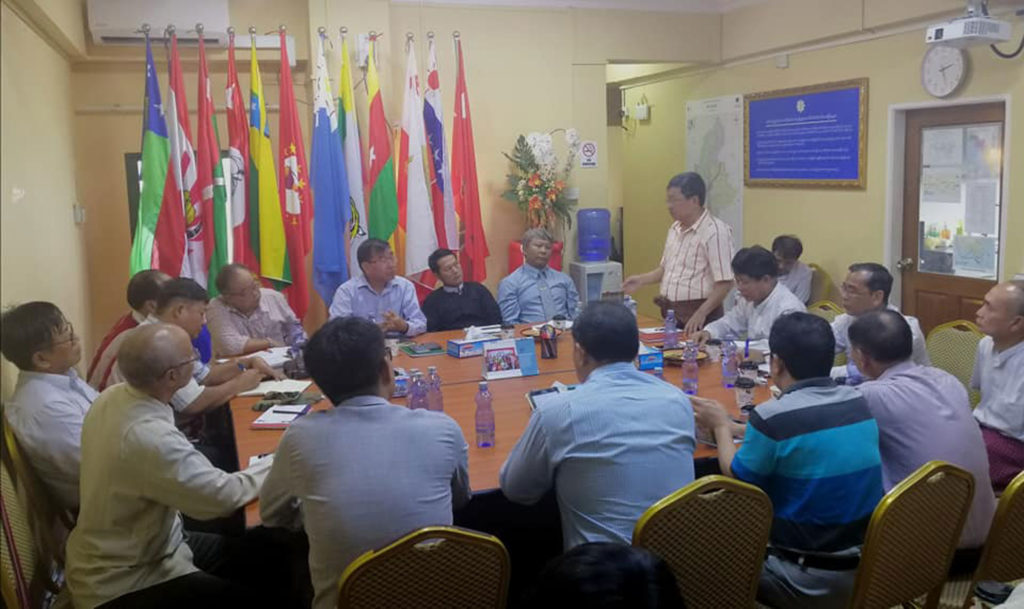The ethnic political parties (EPPs) have come a long way from being a scattered bunch with no political clout in national politics to a well organized political bloc that is aiming to become a Kingmaker or a formidable major or junior partner to one of the mainstream Bamar-dominated political parties, either the National League for Democracy (NLD) or the Union Solidarity Development Party (USDP).

Taking cue from their miserable general elections 2015 outcomes, save for the Shan Nationalities for Democracy (SNLD) and Arakan National Party (ANP) which came out second and first respectively in Shan and Arakan state, the EPPs in Kachin, Chin, Karenni (Kayah), Karen, and Mon formed merger parties in their respective states to contest the November election.
Viewing strength in mergers, five ethnic parties have come together to try to win sizeable votes in seven ethnic states. The said five are Chin National League for Democracy (CNLD), Kachin State People’s Party (KSPP), Karen National Democratic Party (KNDP), Kayah State Democratic Party (KySDP), Mon Unity Party (MUP).
The CNLD is a merger of the Chin Progressive Party, Chin National Democratic Party, and Chin League for Democracy. Political analysts have described the CNLD is the primary ethnic rival of Aung San Suu Kyi’s NLD and USDP in Chin State.
The KSPP is a merger of Kachin Democratic Party, Kachin State Democracy Party, Unity and Democracy Party of Kachin State.
The KNDP is a fusion of Karen Democratic Party, Karen State Democracy and Development Party, and the Karen United Democratic Party.
The KySDP is a merger of All Nationalities Democracy Party, Kayah Unity Democracy Party. It has reached a “no compete” agreement with the Kayan National Party.
The MUP is a merger of All Mon Regions Democracy Party and Mon National Party.
Recent Tatmadaw and NLD row

But only days away from the general elections Tatmadaw, on November 2, issued a seven-point statement heaping blame on the Union Election Commission (UEC) and the government in their handling of the polling process, stating that the government must take responsibility for the UEC mistakes.
Earlier, on August 14, the USDP-led 34 political parties met Commander-in-Chief Min Aung Hlaing and asked him to look into the matter if the election were fraudulent, where he reportedly answered: “There is nothing I won’t dare to do.”
The seven-point statement third paragraph which spelled out the main allegations writes: “But according to official announcements of political parties and their statements to the media and the media news reports, there is widespread violation of the laws and procedures of the pre-voting process, and the information about the situation of the remote areas with poor transport is so hard to receive. Although the Union Election Commission had over four years of preparation time for the 2020 election, there is much weakness even in arranging envelopes for votes and ballot boxes. Although provisions in connection with the pre-votes have already been stipulated in election laws and rules of the respective Hluttaws, there are announcements that are above the existing laws and the statements issued under the pretext of protecting the of voting rights, but that goes beyond the existing laws. So, there appear public doubts. The Republic of the Union of Myanmar conducted a nation-wide census in 2014, and has an annual estimated census in the following years. An estimated number of voters can be received from those census results. However, it is found that the Union Election Commission faced difficulties in counting the number of eligible voters and made a lot of careless mistakes in issuing the voter lists. Additionally, disputes in connection with the pre-voting are surfacing every day at present. The Republic of the Union of Myanmar has been in the process of stage by stage transition to multiparty democracy since the time of the Tatmadaw Government, and could hold the election which is the lifeblood of the multiparty democracy in 2010 and 2015 freely and fairly. Especially, local and foreign observers and organizations unanimously acknowledged the freeness and fairness of the 2015 election. Based on the experiences of the 2010 and 2015 elections, the coming 2020 election should have greater freeness and fairness. But weakness and deficiencies which were never seen in the previous elections are appearing now. They can have adverse impacts on the image of the election.” (Source: Office of the Commander-in-Chief of Defence Services)
“Therefore, it is the responsibility of the UEC and the Union Government, which are mutually responsible, to make the upcoming election of the Republic of the Union of Myanmar a free and fair one,” writes the closing statement, which can be either taken as a mild threat or threatening indication to face serious consequences should the UEC deviate from what the Tatmadaw foresee and consider to be appropriate.
Unfair competition
Furthermore, well ahead of the 60-day official campaign period, in July top government officials were allowed to begin campaigning under the vague clause of the Union Government Law to perform “party organizational works” which helped the government and the commission did not bother to define or delimit, wrote the recent Frontier Myanmar opinion piece.
Apart from this, the UEC censored speeches of political parties broadcasts on state media, the powers which were not wielded by the previous election commission, removing statements on subjects ranging from taxation to child poverty.
And finally, the indiscriminate election cancellation of an estimated 1.5 million voters from conflict-affected areas in ethnic states, reportedly due to security concerns, will effectively leave them out from voting process. But the reality is to clip the wings of the EPPs and more importantly, places in Shan and Arakan states are strongholds of the local EPPs which the NLD has no way to win.
To make the unfairness allegations worse, the entire Pauktaw Township in Arakan State was cancelled for election where only few armed clashes were recorded but NLD-held Paletwa in southern Chin State was allowed to proceed which has suffered some of the worst violence in the war between the Tatmadaw and insurgent Arakan Army, according to Frontier Myanmar and many other media reports.

Remarks of politicians and observers
Regarding the row between the government and the Tatmadaw many political leaders and experts have aired their opinions. A very remarkable speculation which hits the point is made public by SNLD spokesman Sai Leik when interviewed by The Irrawaddy said: “I view it as a hint that the Tatmadaw would respond [with force] if the election results turn out to be different from what they expect. It will be okay for the military if one of its proxy parties can form a coalition government with its allies. But if there is an opposite result, the Tatmadaw may do things that are undesirable.”
“Anyway, we have experienced three coups, in 1958, 1962 and 1988. Because of those coups, our civil war still drags on, peace can’t yet be built, national unity has been shattered and the country is seriously lacking in development. It would be a betrayal of the future to consider staging a coup again. It should not be done,” added Sai Leik with a stark reminder.
Dr. Myo Nyunt (Central Executive Committee member, National League for Democracy) in the same vein said: “Seizing power is an unlawful act, though [the military] can do it anytime. I’d rather not say whether the military’s statements refer to a coup. If they respect the law and really value the people, they should accept anything that is done in line with the law. As they have issued statements, we know their stance now. I don’t want to comment further on their statements.”
U Kyee Myint (lawyer) alleged: “They are not authorized to speak as if they were above the government. They are an institution that must be under the government. If a civil servant criticizes the government, then according to the code of conduct for civil servants, he is disobedient. This is not acceptable for a civil servant.”
“The statements can be read as a threat to seize power. But they won’t. International conditions do not allow it. And the 2008 Constitution already grants sizeable power to the military so that they don’t need to stage a coup. I don’t think they will stage a coup again,” added optimistically that the military takeover won’t happen.
Analysis
As the situation now stands, the dream that whether the EPPs will become a crucial player either as Kingmakers or coalition partners is uncertain as the aftermath of election is unpredictable. In other words, the country’s fate depends on whether the election result will be accepted by the Tatmadaw and its 34 political party backers and how many complaints or challenges the military bloc parties will file with the UEC.
“These challenges are heard by ad hoc tribunals formed by the UEC, which will effectively be charged with marking its own homework. Tribunal decisions cannot be appealed to an independent court, making it even less likely that aggrieved parties and candidates will accept their losses,” according to the Frontier Myanmar recent opinion piece penned by Ben Dunant.
For now, the EPPs and the whole ethnic nationality camp, including the EAOs, will have to wait for the outcome of the elections.
But one sure thing is that the five merger EPPs and commitment to alliance as a bloc to bargain with the mainstream political parties is the way to go for the ethnic nationalities. Hopefully, the Shan and Arakan political parties will join the alliance if the situation calls for after the elections. Likewise, the EAOs would do well to have a similar alliance mechanism when bargaining or striving for their common goals.
And goals are none other than the often stated ethnic equality, rights of self-determination and democracy. In practical terms, it will mean equal ethnic representation in the parliamentary system, complete with acceptable federal constitution and ethnic state constitutions for the EPPs. As for the EAOs, realization of a federal union army instead of the commander-in-chief often promoted standard army, dominated by the ethnic Bamar.
Thus, the coalition-building will depend on political settlement, political give-and-take or bargaining pecked to the above mention core issues. In other words, the EPPs will have to consider what they want most and to what extend they are ready to compromise with the mainstream Bamar parties, as there is no permanent friends or foes in politics. In short, the parties in coalition will have to close the political position gap, one way or the other, to be able to work together.
All in all, the country is still in the midst of constitutional crisis starting from the military coup in 1962. And unless this core problem is resolved, Burma or Myanmar will never be at peace, not to mention the achievement of national reconciliation, and it doesn’t matter whether the power holder is the NLD or USDP after the general elections.











Leave a Comments